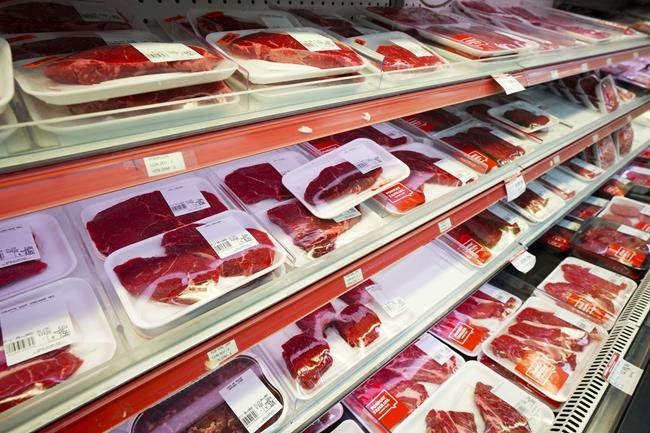Canadians are continuing to feel the pinch at the grocery store as food prices continue to soar at the fastest rate in four decades, and one economist says there likely won't be any meaningful relief until early next year.
"It's definitely going to take a little bit of time, for example, for any input prices to work through layers of the manufacturing process down to wholesalers, down to retailers before they show up as slower price growth on consumers' receipts," RBC economist Claire Fan said in an interview.
Statistics Canada's latest consumer price index report released Wednesday showed that while overall inflation cooled slightly to 6.9 per cent in September from 7.0 per cent in August, food prices were up a staggering 11.4 per cent compared with a year ago.
Food prices increased at the fastest rate since August 1981 in September and have been increasing at a faster rate than all the items the consumer price index tracks for 10 consecutive months.
Food price growth remained broad-based in the month.
Statistics Canada said on a year-over-year basis, Canadians paid more for items such as meat, which was up 7.6 per cent, dairy products, which rose 9.7 per cent, bakery products, which rose 14.8 per cent, and fresh vegetables which were up 11.8 per cent.
Canadians also paid a lot more for fresh fruit, which was up 12.7 per cent, coffee and tea, which were up 16.4 per cent, seafood, which rose 7.6 per cent, non-alcoholic beverages, which were up 14.7 per cent, and cereal products, excluding baby food, which rose 17.9 per cent.
The agency said unfavourable weather conditions contributed to food price increases.
Higher prices for important inputs such as fertilizer and natural gas, as well as geopolitical instability stemming from Russia's invasion of Ukraine also contributed to the increases, Statistics Canada said.
Fan added that higher transport costs, longer transport times, higher packaging prices, as well as labour costs — tied to wage growth, in particular, given ongoing labour shortage issues — are all putting pressure on how much shoppers are paying at the grocery store.
Michelle Wasylyshen spokesperson for the Retail Council of Canada said in a statement that the biggest driver of higher prices on grocery shelves is vendors — manufacturers, processors and wholesalers of food — "raising rates repeatedly and almost across the board."
"We know that vendors’ own costs are soaring, primarily because the prices from farmers, growers and importers have been increasing at unprecedented rates," she said.
In a note, CIBC economist Karyne Charbonneau said that although food prices continue to rise at a historic pace, it is not the main focus for the Bank of Canada, which is paying closer attention to core inflation, which excludes food and energy due to their prices being more volatile.
Simon Somogyi, University of Guelph professor and Arrell Chair in the Business of Food, said in an interview that rising interest rates should make the Canadian dollar stronger which would help make food imports cheaper.
Imports make up a large part of the food eaten in Canada, especially fruits and vegetables during the winter.
However, the effects of rising interest rates on the loonie are being offset by the high U.S. dollar and high inflation south of the border, and that is having an impact on food prices, he explained.
Somogyi said that it likely won't be until the spring at the earliest that Canadians start seeing food prices decrease.
The latest data from Statistics Canada comes as some Canadian grocery chains get vocal about their prices.
On Monday, Loblaw Companies Ltd. said it would freeze prices on all its in-house No Name products until Jan. 31, 2023, a campaign met with critics warning the company could look to recoup profit losses elsewhere.
Meanwhile, Metro Inc. said Tuesday it is holding food prices steady as usual this holiday season and will not accept cost increases from its suppliers during this period.
This report by The Canadian Press was first published Oct. 19, 2022.
Adena Ali, The Canadian Press



